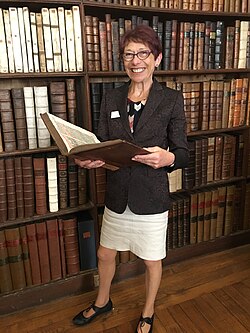Patricia Fara | |
|---|---|
 Fara in 2018 | |
| Known for | Women in science |
| Academic background | |
| Alma mater | University of Oxford |
| Academic work | |
| Discipline | History of science |
| Institutions | University of Cambridge |
Patricia Fara is a college lecturer in the history of science at Clare College,Cambridge. She is a graduate of the University of Oxford and did her PhD at the University of London. [1] She is a former Fellow of Darwin College and is an Emerita Fellow of Clare College,where she was previously Director of Studies in the History and Philosophy of Science. [2] Fara was also a College Teaching Officer in the Department of History and Philosophy of Science. [3] From 2016 to 2018,Fara was President of the British Society for the History of Science. In 2016,she became President of the Antiquarian Horological Society. [4] [5] Fara is author of numerous popular books on the history of science and has been a guest on BBC Radio 4's science and history discussion series In Our Time . [6]